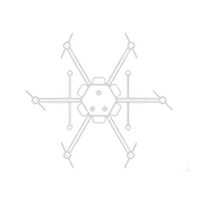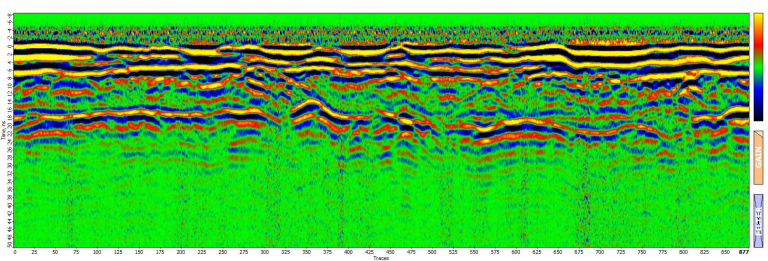Professional Drones for
GPR and Magnetometers
Systems
Integrated
Sensors
Industrialists
Technology
RTK
Software
Dedicated
Acquire data from the subsurface quickly,
safe and efficient
In most cases, surveys with GPR (Georadar) or Magnetometer are hard work and can be very dangerous
for field personnel due to hostile environments and harsh weather conditions.
This is where professional drones for automated remote sensing come in.
They are compact, easily transported in a car and able to fly
autonomously at low altitudes with high accuracy.
This approach ensures the acquisition of data in less time than traditional trolley or hand-held methods.
GPR and Magnetometers integrated on drones allow them to see through the ground surface,
ice, rocks, fresh water in hazardous environments without compromising the safety of personnel,
Providing an efficient and high-performance solution.

Efficient
Acquire data faster than traditional methods

Precise
The drone's precise positioning and rangefinder systems ensure high-precision measurements

Cheap
UAV surveys are more cost-effective than traditional methods

Sure
The integrated system can be used in hazardous and unsafe environments without compromising the safety of personnel

Precise
GNSS RTK positioning systems and Radar rangefinder ensure accurate measurements at very low altitude

Smart
Total integration between sensor, drone and software ensure precise and intuitive operation
EXAMPLES OF APPLICATIONS
TOTAL INTEGRATION WITH DRONE
Thanks to the SkyHub, we can now integrate sensors such as Georadar and Magnetometers on drones like DJI Matrice 300/350 RTK
and with the help of the radar distometer in the Drone Integration Kit, we can safely fly
these sensors a few centimeters above the ground, following the contour of the ground.
The use of Georadar and Magnetometers on drones facilitates and makes normal acquisitions much faster and more accurate
done normally by trolley, especially in rough terrain and inaccessible areas.
Sensor data is logged on board and streamed to the ground via the drone’s radiolink to enable
to the operator to detect any “anomalies” in real-time, the mission is handled fully automatically with the supplied software
UGCS
Main Applications
- Ground Mine Search, UXO (Unexploded Ordnance)
- Archaeology
- Subservices research
- Investigation of rough terrain
- Detection of small objects
- Bathymetric surveys in fresh water
- Geological surveys for ground level profiling
- Mapping of underground infrastructure
- Identification of crevasses
- Glacier surveys



Effective
All Drone + GPR or Magnetometer Kits are designed to acquire large areas better and faster without interrupting work or site activities

Precise
Calibrated Sensors combined with GNSS RTK Systems always ensure the highest level of precision with accuracy down to the centimeter

Safe
Difficult to access or dangerous areas will no longer be a problem with our fully integrated Drone GPR or Magnetometer solutions.

Competitive
Drone Geophysical Survey provides reduced field acquisition time and drastic reduction in post processing time allowing you to be more competitive
Discover our integrated solutions

Drone Georadar
Drone bundle with Georadar ready to use
- 1 x Standard Kit GPR Zond Aero 500
- 1 x Drone Matrix 350 RTK
- 4 x Drone Batteries TB 65
- 1 x BS65 Charging Station for Drone Batteries
- 1 x SkyHub Kit with Terrain Following Nanoradar
- 1 x UGCS Pro mission planning software
- 1 x Skyhub Software Package for GPR
- 1 x Mounting kit for GPR system for DJI M300/M350 RTK drone
- 1 x Setup and installation of the Drone + GPR system
- 1 x 4-hour preparatory course

Drone Magnetometer
Drone Bundle with Magnetometer ready to use
- 1 x MagDrone R3 Standard Magnetometer Kit
- 1 x Drone Matrix 350 RTK
- 4 x Drone Batteries TB 65
- 1 x BS65 Charging Station for Drone Batteries
- 1 x SkyHub Kit with Terrain Following Nanoradar
- 1 x Skyhub Software Package for Magnetometer
- 1 x UGCS Pro mission planning software
- 1 x Mounting kit for GPR system for DJI M300/M350 RTK drone
- 1 x Setup and installation of the Drone + GPR system
- 1 x 4-hour preparatory course
HOW IT WORKS.
The system consists of a UAV integrated with Ground Penetrating Radar (GPR) or Magnetometer.
Full integration is ensured by adding the SkyHub on-board computer to the system.
The drone flight is planned and managed using the full functionality of UgCS.
You can choose between an off-the-shelf system with drone or Georadar and single Magnetometers
to be used with classical methodology(trolley or handheld)

DJI M300, M350, M600 and X1000 Pro RTK Series Shelf Drones
or Pixhawk with ArduCopter/PX4 firmware

GPR or Magnetometer selected according to survey objectives

Laser altimeter or radar to fly automatically in True Terrain Following (TTF) mode.

Flight planning and control software showing GPR/Magnetometer status data
DISCOVER IN-DEPTH WEBINARS
WHY USE AIRBORNE GPR+DRONE
The webinar provides an introduction to the use of airborne GPR on drones-the possibilities offered by the integrated GPR+drone system. The webinar covers the basics of using Ground Penetrating Radar (GPR) with a drone:
What is a GPR and why use it with a drone?
Planning and flying a drone survey mission with GPR (in simulation mode)
Demonstration of data analysis using data acquired during surveys: – pipeline inspection – location of a World War II fighter plane lost in Greenland
Questions and Answers
APPLICATIONS
DETECTION OF SMALL OBJECTS
Radar Systems Zond-12 and Drone 1000 at GPR is applicable to detect small objects with a diameter as small as 8 cm and pipes/cables with a diameter as small as 3 cm. The integrated GPR+drone system can be used either by drone or for ground surveys if conditions do not allow the use of a drone.
FRESHWATER BATHYMETRY
The integrated GPR-drone system can measure water depth or profile the bottom of rivers, lakes, freshwater ponds up to 15 meters deep.
Advantages-ability to work even when the water is frozen or the water surface is partially covered with ice. Compared with bathymetry using a boat (equipped with a depth sounder), the drone with GPR offers better accuracy in following survey lines due to its built-in GPS and automated flight. Also, in most cases, a drone makes it much easier to deliver the necessary equipment to the desired area. More details on GPR in the air for bathymetry >>>
The result shown in Figure 3 was collected with the drone flying at an altitude of 2 meters above the water surface, speed 2 m/s. Airborne GPR datasets. >>>

GEOLOGICAL SURVEYS FOR STRATA PROFILING
Layer profiling is a standard activity that must be performed prior to any serious area development or construction work. The standard technique is to drill dozens of holes or conduct a GPR survey on carts.
The integrated GPR+drone system offers increased labor productivity and enables safer working conditions for personnel in rough terrain.
GPR makes it possible to find any potentially dangerous underground streams or lakes.
Data collected by GPR on the drone flying at an altitude of 1 meter over an asphalt-covered parking lot. The layers are clearly visible.
MAPPING OF UNDERGROUND INFRASTRUCTURE
Mapping underground infrastructure is an important task before starting any construction work on previously developed land or in cases where there is a lack of documentation and actual maps for underground infrastructure.

TRUE TERRAIN FOLLOWING
Acquire the best possible data by flying the GPR as low as possible mimicking the surface relief. The addition of an altimeter to the system will allow flying in True Terrain Following mode.
UgCS SkyHub allows the drone to fly at low altitudes (down to 1 meter) without the need to import an accurate DEM (Digital Elevation Model) height map into UgCS.
CASE STUDIES.
BATHYMETRIC SURVEY OF SILKEBORG LAKE
- Client: Landinspektorer A/S geopartner.dk
- Aim: To determine the change in the shape of the bottom of the water reservoir due to exploitation.
- Technology: Integrated drone system with Cobra Plug-In antenna GPR SE-150
- Flight Control: UgCS
- Result: Profile of the freshwater basin defining its depth
LOCATION OF BURIED GAS PIPES
- Pilot project in collaboration with: Conexus Baltic Grid, JSC
- Aim: To test the applicability of airborne penetrating radar (GPR) for locating underground gas pipes.
- Technology: 124 MHz and 500 MHz GPR antennas integrated with a drone.
- Flight control: UgCS with True Terrain Following mode.
- Result: the 700 mm steel pipe is clearly detectable from an altitude of up to 7 meters using a 500 MHz GPR system on sandy ground (typical for Latvia).
LOCATION OF AIRCRAFT BURIED UNDER GREENLAND ICE
- Client: Arctic Hotpoint Solutions and Fallen American MIA Repatriation Foundation (FAMIARF)
- Objective: to locate the P-38 “Echo” of a dogfighter. U.S. lost during the events of World War II
- Technology: Integrated GPR+drone system managed with UgCS software
- Result: the acquired data showed anomalies at a depth of about 100 m
ARCHAEOLOGICAL SURVEY OF THE INCA RUINS
- Client: Archaeological Surveyors, Peru
- Aim: To test the applicability of systems for archaeological survey to locate the remains of Inca ruins.
- Technology: Ground Penetrating Radar (GPR) integrated with an altimeter-equipped drone, enabling the drone to fly in True Terrain Following mode.
- Flight Control: UgCS with True Terrain Following mode
- Result: Acquired data with anomalies detected, to be used for further research
FRESHWATER BATHYMETRY
- Client: Project 1667
- Aim: To determine the applicability of GPR in the current area on the ocean coast.
- Technology: Ground Penetrating Radar (GPR) integrated with an altimeter-equipped drone, enabling the drone to fly in True Terrain Following mode.
- Flight Control: UgCS with True Terrain Following mode
- Result: GPR proves applicable in areas at a certain distance from the ocean coast – analysis of test data presents a penetration of up to 5-10 meters
PROJECT 1667 - SEARCH FOR THE WRECK OF THE GOLDEN SHIP
- Client: Project 1667
- Aim: To determine the applicability of GPR in the current area on the ocean coast.
- Technology: Ground Penetrating Radar (GPR) integrated with an altimeter-equipped drone, enabling the drone to fly in True Terrain Following mode.
- Flight Control: UgCS with True Terrain Following mode
- Result: GPR proves applicable in areas at some distance from the ocean coast – analysis of test data presents penetration up to 5-10 meters
Talk to one of our Experts
DroneBase provides you with an Expert Advisor
Able to recommend the most appropriate product for your needs
And answer all your questions.
Call us NOW!
+39.0541.1790411
Request information
Please enter your details below, our consultant will
will contact back as soon as possible and provide you with all the details!
